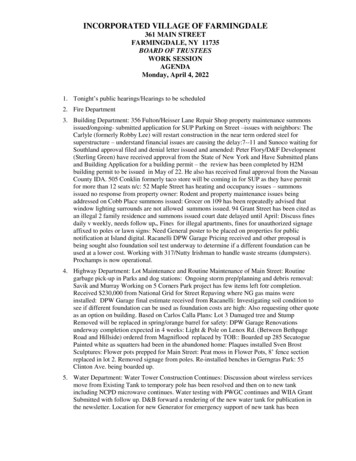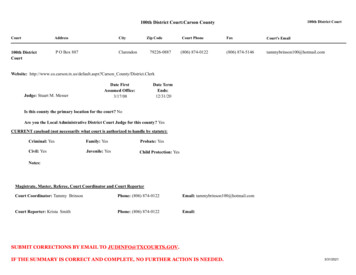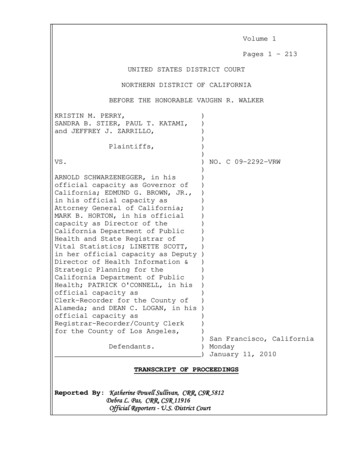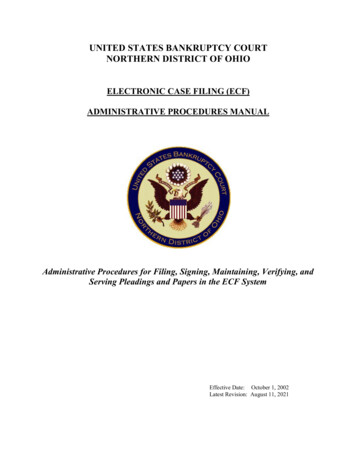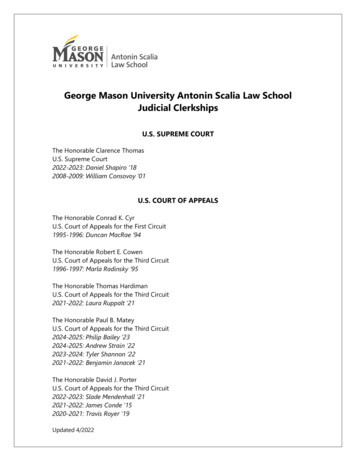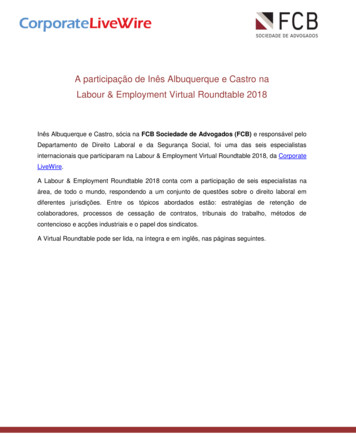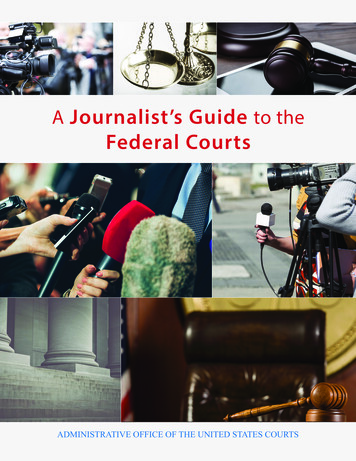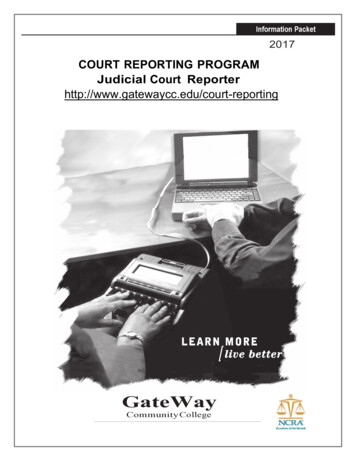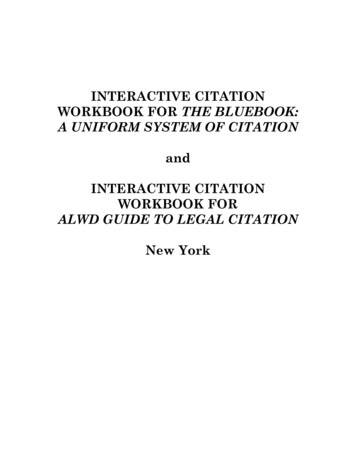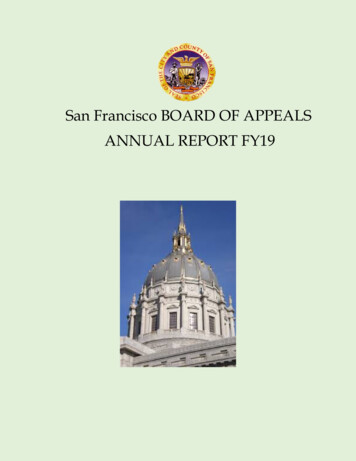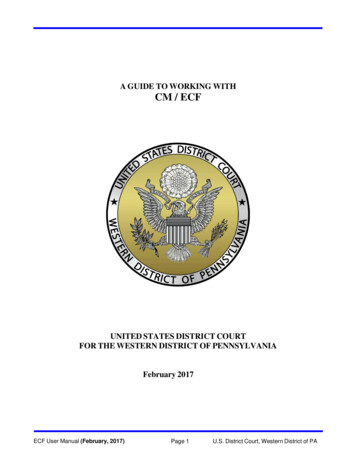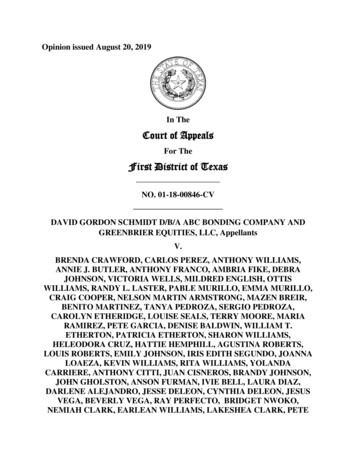
Transcription
Opinion issued August 20, 2019In TheCourt of AppealsFor TheFirst District of Texas————————————NO. ID GORDON SCHMIDT D/B/A ABC BONDING COMPANY ANDGREENBRIER EQUITIES, LLC, AppellantsV.BRENDA CRAWFORD, CARLOS PEREZ, ANTHONY WILLIAMS,ANNIE J. BUTLER, ANTHONY FRANCO, AMBRIA FIKE, DEBRAJOHNSON, VICTORIA WELLS, MILDRED ENGLISH, OTTISWILLIAMS, RANDY L. LASTER, PABLE MURILLO, EMMA MURILLO,CRAIG COOPER, NELSON MARTIN ARMSTRONG, MAZEN BREIR,BENITO MARTINEZ, TANYA PEDROZA, SERGIO PEDROZA,CAROLYN ETHERIDGE, LOUISE SEALS, TERRY MOORE, MARIARAMIREZ, PETE GARCIA, DENISE BALDWIN, WILLIAM T.ETHERTON, PATRICIA ETHERTON, SHARON WILLIAMS,HELEODORA CRUZ, HATTIE HEMPHILL, AGUSTINA ROBERTS,LOUIS ROBERTS, EMILY JOHNSON, IRIS EDITH SEGUNDO, JOANNALOAEZA, KEVIN WILLIAMS, RITA WILLIAMS, YOLANDACARRIERE, ANTHONY CITTI, JUAN CISNEROS, BRANDY JOHNSON,JOHN GHOLSTON, ANSON FURMAN, IVIE BELL, LAURA DIAZ,DARLENE ALEJANDRO, JESSE DELEON, CYNTHIA DELEON, JESUSVEGA, BEVERLY VEGA, RAY PERFECTO, BRIDGET NWOKO,NEMIAH CLARK, EARLEAN WILLIAMS, LAKESHEA CLARK, PETE
GONZALES, PAT LEE, MARY VICTORIAN, TIFFANY JOHNSON,ELIAS GAMINO, TIFFANY CHENIER, MURALINE PETER, VICTORREYES, VERONICA SMITH, JIMMIE ENGLETT, VELVET HILTON,STEPHEN LACY, LEROY VANTERPOOL, PATRICIA WESLEY,SAMMIE L. ABRAHAM, EDITH M. ABRAHAM, BRENDA BROWN,JESUS SILVESTRE, FELICITA AGUILAR, GABINO SALAZAR,JOSEFINA M. NOWLIN, SANDRA DORRON, JESUS VELAZQUEZ,BONNIE CEPHUS, JOSEPHINE ROCHA, LEON JACOBSON, LINDAJACOBSON, OLIVIA SIMS, CONSTANCE GAY, ENSLEY CLINTON,LLEWEL WALTERS, MAURO REYNERIO FERNANDEZ CRUZ,ANTHONY THOMPSON, JUAN CARLOS RIOS RAMIREZ, PHILLIP C.CLARK, BEATRICE PENA, CAROL ASKEW, BRIAN CORMIER,STEVEN CRUZ, LEROY WELLS, HAROLD KINNARD, PLUSHATTEDAVIS, DEIDRE DOBBINS, DAVID SPAULDING, MICHAEL KOSSA,DIANA KOSAS, SERAFIN LUNA, DEBORAH BERRYHILL, O’KEEFEALLEN, CHRISTOPHER P. VANA, SR., GRACE HAMILTON, BELINDASPENCER, RENORA RIGGINS, IVONNE JACKSON, EDITH ORDONEZ,WILBER ORDONEZ, TESSIE LYNCH, KATHERINE SANDERS,CHARLES MOURNING, ILIANA PEREZ, TIBURCIA ZAYALA,CHRISTOPHER GREEN, DONALD SHELTON, DONALD CREDEUR,AVIS BATTLE, GRACE PHILLIPS, DAROLYN LEWIS, RAYMONDLEWIS, JR., MICHAEL MILLER, ESTHER DOUBLIN, MARCOS ORTIZ,ROBERT SANCHEZ, ROSALINDA SANCHEZ, TIFFANY SHANNON,ALTHA DAVIS, HERMAN DAVIS, NELSON HEBERT, MELVINHERRERA, JUANITA CANO, PATRICE BOYCE, EDSONDRONBERGER, CHARLOTTE WYNN, JACQUELINE HILL, ATANACIORUIZ, ELOISA RUIZ, ROBERTO HERNANDEZ, CLEMENTINAHERNANDEZ, JIM SILVA, LUZ BATALLA, ISMAEL MEDINA,HORTENCIA RODRIGUEZ, ALFRED WATSON, JERRY ESCALANTE,LLOYD CASTILOW, LUIS PENA, CAREY MURRAY, LUZ WILDMAN,CARL EARL, ISMAEL AVELLANEDA, KENDALIA DAVIS, GAIL FRITZ,LEE CARTWRIGHT, ORFILIA MIRANDA, JAINELL LETRYCEVELAZQUEZ BUTLER, COURTNEY MITCHELL, TRAVIS WATERS,DEBBIE WATERS, ANTHONY NORRIS, SHARON A. NORRIS,ADELMIRA SALINAS, SARAH LANDRY, GLORIA GARCIA, JOELZAMARRIPA, GERARDO ROMO, PHILLIP ROSS, LAKEISHA ROSS,EARLINE DURANT WATKINS, GERARDO MARQUEZ, NILZARODRIGUEZ, JANNETTE BROWN, VICTOR H. ESTRADA, BLANCA A.ESTRADA, ANNE CLARE, JAMES CLARE, CHARLENE TALBOTT,MARIA VELEZ, GREG HILLIGIEST, RANDY WILSON, SAUL2
AGUILERA, HARLENE BRADY, MARY FLOWERS, JIMMIE SMITH,BETTY R. SMITH, CYNTHIA JENKINS, CLARENCE MCDADE,CHARLES O. MCDONALD, LARS WESTERBERG, ETHEL O’QUINN,JEFFREY GLOVER, KATRINA GLOVER, LAURA LIGGETT, BRENDATRUSSEL, DALE TRUSSELL, CECELIA ROSE, VANESSA BOURDA,FRANCISCO CAMPOS, CONNIE CAMPOS, SAMMY J. COLLINS,FELICIA BOWMAN, KENDALL WILKINS, TYRONSA WILKINS,ANDREW TAYLOR, MARQUE JOHNSON, BEVERLY HENSLEY,YVONNEYA BROWN, COURTNEY HERNANDEZ, ALBERT ROWAN,TONI OWENS, JIMMY KIRKENDOLL, JOAN L. KIRKENDOLL, MARYANN EDJEREN, THELMA HOUSLEY, KENNETH JOHNSON, JUDITHANN WALKER, LESLIE BROWN, DEBORAH EATON, STUARTWILLETT, JOSE TORRES, DIANA SALINAS, ERSKINE VANDERBILT,CAROLINE TUNSEL, CATHY JONES, GAIL UDOSEN, REGINAFULTON, HECTOR REYES, LUCIO TORRES, JR., ERNESTO LARA,JACKIE THORNTON, ALFREDO DIMAS, NANCY TAYLOR, REGINALDCOLE, CATHLYN COLE, GERALD SMITH FOR THE ESTATE OFEARNEST D. SMITH, FAUCINDA VENCES, THUYVI VINH, MAIDAKHATCHIKIAN, CARL EARL, TROY KING, DIANA ROMERO, SANDRAPYLE, GARY DIAL, MARIA MENDEZ, ANTHONY HARRIS, KEENAHARRIS, KATHERINE STEWART, MARY CURRIE, SIVERANDSTERLING, JR., LARRY TANKERSLEY, LESLIE JONES, GONZALOPENA, JOHN LONG, BEVERLY LONG, TERRY RANDLE, AND FELICIAFRANK, AppelleesOn Appeal from the 55th District CourtHarris County, TexasTrial Court Case No. 2018-31381O P I N I O NHundreds of plaintiffs sued David Gordon Schmidt, doing business as ABCBonding Company, and Greenbrier Equities, LLC, contending that Schmidt andGreenbrier filed illegal liens on the plaintiffs’ homesteads. Schmidt and Greenbrier3
moved to dismiss the plaintiffs’ claims under the Citizens Participation Act. The trialcourt denied the motion on the ground that the Act did not apply to the plaintiffs’claims. We affirm in part, reverse in part, and remand for further proceedings.BACKGROUNDThe plaintiffs allege multiple causes of action. The gravamen of their claimsis that Schmidt and Greenbrier had the plaintiffs sign deeds of trust as to their homesas security for bail bond loans, fraudulently altered these deeds to inflate the amountof indebtedness, and later filed the deeds in Harris County’s real property records,thereby creating illegal liens on the plaintiffs’ homesteads. Among other relief, theplaintiffs sought statutory damages of at least 10,000 per illegal lien. See TEX. CIV.PRAC. & REM. CODE §§ 12.001–.007. They also sought to quiet title and a declarationthat the liens are invalid because they violate various provisions of article XVI,section 50 of the Texas Constitution.Schmidt and Greenbrier filed general denials. They also moved to dismiss thesuit under the Citizens Participation Act. See TEX. CIV. PRAC. & REM. CODE§§ 27.001–.011. In their motion, Schmidt and Greenbrier stated that the plaintiffsrepresented in the deeds of trust they signed that the homes they pledged as securitywere not homesteads. Schmidt and Greenbrier contended that the plaintiffs’ claimsshould be dismissed under the Act because the claims were based on, related to, orwere made in response to Schmidt and Greenbrier’s exercise of their right to free4
speech or right to petition—specifically, the filing of the deeds of trust in HarrisCounty’s real property records.The trial court denied the motion to dismiss. The court reasoned:The Plaintiffs’ claims do not impact a matter of public concernas defined in CPRC 27.001(7) simply because they relate to publicfilings, or because those filings may be “false.” Imagine the havoc ifevery routine public filing was “a matter of public concern” simplybecause it was a public filing. Further, if filing suit under Chapter 12 ofthe CPRC implicates the anti-SLAPP statute, then Chapter 12 isessentially abrogated.DISCUSSIONSchmidt and Greenbrier contend that the trial court erred in denying theirmotion to dismiss under the Act. The plaintiffs respond with three counterarguments.First, they argue that their claims fall outside the scope of the Act because theirclaims are not based on, related to, or made in response to Schmidt and Greenbrier’sexercise of their right to free speech or right to petition. Second, they contend thateven if their claims did come within the scope of the Act, their claims come withina statutory exemption for commercial speech. Third, the plaintiffs contend thatapplication of the Act to their claims abrogates their rights under article XVI, section50 of the Texas Constitution, which governs homestead liens.Standard of Review and Applicable LawWe review de novo a trial court’s denial of a motion to dismiss under theCitizens Participation Act. Holcomb v. Waller Cty., 546 S.W.3d 833, 839 (Tex.5
App.—Houston [1st Dist.] 2018, pet. denied). We likewise interpret the Act anddecide whether it applies to a suit de novo. See Youngkin v. Hines, 546 S.W.3d 675,680 (Tex. 2018); Better Bus. Bureau of Metro. Houston v. John Moore Servs., 500S.W.3d 26, 39 (Tex. App.—Houston [1st Dist.] 2016, pet. denied).In assessing whether a suit or challenged claim comes within the Act’s scope,we rely on the Act’s language, interpreting it as a whole rather than reading itsindividual provisions in isolation from one another. Youngkin, 546 S.W.3d at 680.We interpret the Act according to the plain, common meaning of its words, unless acontrary purpose is evident from the context or a plain reading of its text leads toabsurd results. Id. We cannot judicially amend the Act by imposing requirementsthat the Act does not or by narrowing its scope contrary to its terms. CadenaComercial USA Corp. v. Tex. Alcoholic Beverage Comm’n, 518 S.W.3d 318, 337(Tex. 2017); see ExxonMobil Pipeline Co. v. Coleman, 512 S.W.3d 895, 899 (Tex.2017) (per curiam) (court presumes that Legislature purposely omitted words thatare not included in Act). Nor can we substitute the words of the Act to give effect towhat we think the Act should say. ExxonMobil, 512 S.W.3d at 901.The Act directs us to liberally interpret its provisions to fully effectuate itspurpose, which “is to encourage and safeguard the constitutional rights of personsto petition, speak freely, associate freely, and otherwise participate in government tothe maximum extent permitted by law and, at the same time, protect the rights of a6
person to file meritorious lawsuits for demonstrable injury.” TEX. CIV. PRAC. & REM.CODE §§ 27.002, 27.011(b). To accomplish this purpose, the Act provides asummary procedure in which a party may move for dismissal on the basis that theclaims made against it are based on, relate to, or are in response to the party’sexercise of the right of free speech, right to petition, or right of association. TEX.CIV. PRAC. & REM. CODE § 27.003(a); see In re Lipsky, 460 S.W.3d 579, 589–90(Tex. 2015). This summary procedure requires a trial court to dismiss a suit, orparticular claims within a suit, that demonstrably implicate these rights, unless thenon-moving party can at the threshold make a prima facie showing that its claimshave merit. Sullivan v. Abraham, 488 S.W.3d 294, 295 (Tex. 2016).A motion to dismiss made under the Act generally entails a three-stepanalysis. Youngkin, 546 S.W.3d at 679. The movant first must prove by apreponderance of the evidence that the challenged claims are based on, relate to, orare in response to its exercise of the right of free speech, right to petition, or right ofassociation. TEX. CIV. PRAC. & REM. CODE § 27.005(b). The non-movant’s pleadingis the best evidence of the nature of its claims. Hersh v. Tatum, 526 S.W.3d 462, 467(Tex. 2017). When it is clear from the non-movant’s pleadings that the claims arecovered by the Act, the movant need not show more. Adams v. Starside CustomBldrs., 547 S.W.3d 890, 897 (Tex. 2018).7
The Act defines the rights of free speech, petition, and free association. TEX.CIV. PRAC. & REM. CODE § 27.001(2)–(4). We are bound by these statutorydefinitions. Youngkin, 546 S.W.3d at 680. Relevant to this appeal, the exercise offree-speech rights is defined as “a communication made in connection with a matterof public concern.” TEX. CIV. PRAC. & REM. CODE § 27.001(3). Communicationsinclude statements or documents made or submitted in any form or medium. Id.§ 27.001(1). Matters of public concern include issues relating to health or safety;environmental, economic, or community well-being; the government, a publicofficial or figure; or a good, product, or service in the marketplace. Id. § 27.001(7).Taken together, these statutory definitions safeguard an expansive right to freespeech. See Lippincott v. Whisenhunt, 462 S.W.3d 507, 509 (Tex. 2015) (per curiam)(Act “broadly defines” free speech); see also Adams, 547 S.W.3d at 896 (Act’s listof matters of public concern is non-exclusive).If the movant carries its burden by showing that the challenged claims arebased on, relate to, or are in response to the exercise of its rights to speak, petition,or associate, the trial court must dismiss the claims unless the non-movant makes byclear and specific evidence a prima facie case for each element of the challengedclaims. TEX. CIV. PRAC. & REM. CODE § 27.005(c); Youngkin, 546 S.W.3d at 679. Aprima facie case is the minimum evidence necessary to support a rational inferencethat a factual allegation is true; in other words, a prima facie case requires the non8
movant to come forward with evidence that, if uncontradicted, is legally sufficientto establish that a claim is true. S & S Emergency Training Sols. v. Elliott, 564S.W.3d 843, 847 (Tex. 2018). Mere notice pleading is not sufficient to satisfy theprima facie standard. Bedford v. Spassoff, 520 S.W.3d 901, 904 (Tex. 2017) (percuriam).If the non-movant makes a prima facie case in support of the challengedclaims, the burden then shifts back to the movant to prove by a preponderance of theevidence each element of a valid defense to these claims. TEX. CIV. PRAC. & REM.CODE § 27.005(d); Youngkin, 546 S.W.3d at 679–80. If the movant carries thisburden, the trial court must dismiss the claims. Youngkin, 546 S.W.3d at 681.AnalysisA.Schmidt and Greenbrier did not waive their arguments under theCitizens Participation Act as to any of the plaintiffs’ claims.The plaintiffs initially contend that Schmidt and Greenbrier waived the rightto seek dismissal of the plaintiffs’ claims to quiet title and for declaratory judgmentby not separately addressing these claims in their appellate brief. We disagree.In the trial court, Schmidt and Greenbrier moved to dismiss the entire suit,and they appeal from the trial court’s denial of their motion. The same allegationsunderlie all of the plaintiffs’ claims. Assuming that the Citizens Participation Actapplies, the plaintiffs have not explained how the Act could apply to some of theirclaims but not others.9
Thus, we reject the plaintiffs’ waiver argument. See TEX. R. APP. P. 38.1(f)(statement of issue or point in brief covers every subsidiary question fairly included);see also Adams, 547 S.W.3d at 896–97 (defendant who contended in trial court thatit was entitled to dismissal under Act because its speech was on a matter of publicconcern preserved subsidiary issues for appeal).B.The plaintiffs’ claims were made in response to Schmidt andGreenbrier’s exercise of their right to free speech, and the plaintiffs havenot made a prima facie case in support of their claims.1.Schmidt and Greenbrier’s exercise of the right to free speechSchmidt and Greenbrier’s filing of the deeds of trust and the resulting liensform the underlying factual basis for all of the plaintiffs’ claims. The relief theplaintiffs seek similarly concerns the liens; they seek removal of the liens, recoveryof lien payments, and 10,000 in statutory damages per lien. The claims madeagainst Schmidt and Greenbrier therefore are based on, relate to, or are in responseto their filing of the deeds of trust and resulting liens. The dispositive question as towhether the plaintiffs’ claims come within the Act’s scope therefore is whether thesefilings constitute the exercise of free speech under the Act.Schmidt and Greenbrier contend that instruments filed in a county’s realproperty records constitute the exercise of free speech because they are “acommunication made in connection with a matter of public concern.” TEX. CIV.PRAC. & REM. CODE § 27.001(3). These filings are “communications,” as that term10
“includes the making or submitting of a statement or document in any form ormedium, including oral, visual, written, audiovisual, or electronic.” Id. § 27.001(1).Schmidt and Greenbrier contend that these communications are made in connectionwith a matter of public concern because they are intended to inform the public ofencumbrances affecting the transferability of real property and thus concern goodsand services in the marketplace as well as economic or community well-being. Seeid. § 27.001(7)(B), (E) (“matter of public concern” includes issues related to“environmental, economic, or community well-being” or “a good, product, orservice in the marketplace”); TEX. PROP. CODE § 13.002(1) (properly recordedinstruments provide “notice to all persons of the existence of the instrument”).Schmidt and Greenbrier rely in part on the Fourth Court’s application of theCitizens Participation Act to financing statements in Quintanilla v. West, 534S.W.3d 34 (Tex. App.—San Antonio 2017), rev’d on other grounds, 573 S.W.3d237 (Tex. 2019). In that case, the court of appeals held that a defendant’s filing offinancing statements in the real property records to perfect a security interest fellwithin the scope of the Act’s definition of the exercise of free speech. Id. at 37–38.The court thus held that the plaintiff’s claims for slander of title and fraudulent lienswere subject to dismissal. See id. The court reasoned that the financing statementsrelated to real property sellable in the marketplace and therefore qualified as a matter11
of public concern under subsection (7)(E)’s provision for issues relating to goods inthe marketplace. See id. at 43–46.We disagree that the plain, common meaning of “good” is broad enough toembrace real property. “Goods” ordinarily refer to tangible or moveable personalproperty, as opposed to realty. See Goods, NEW OXFORD AMERICAN DICTIONARY (3ded. 2010) (defining term as “merchandise or possessions”); Goods, BLACK’S LAWDICTIONARY (11th ed. 2019) (defining term to include tangible or moveable personalproperty other than money, particularly merchandise, and referring to “goods andservices” as an illustration of the term’s ordinary usage); see also Realty, BLACK’SLAW DICTIONARY (11th ed. 2019) (defining “realty” or “real property” as “land andanything growing on, attached to, or erected on it”). The Legislature has includedreal property within the definition of “goods” in at least one other context; under theDeceptive Trade Practices Act, both tangible chattels and real property are “goods.”See TEX. BUS. & COM. CODE § 17.45(1). But the Deceptive Trade Practices Act is aninstance in which the Legislature intentionally and explicitly defined “goods”beyond its ordinary usage. See Aetna Cas. & Sur. Co. v. Martin Surgical Supply Co.,689 S.W.2d 263, 268 (Tex. App.—Houston [1st Dist.] 1985, writ ref’d n.r.e.) (notingthat DTPA initially defined “goods” as “tangible chattels” but was later amended toinclude real property). The Citizens Participation Act, in contrast, does not expandthe definition of “good” beyond its ordinary usage, and we cannot judicially amend12
its language to give the term a more expansive meaning than it ordinarily bears. SeeExxonMobil, 512 S.W.3d at 901. Thus, we reject Quintanilla’s holding that realproperty filings relate to goods in the marketplace.This court has held on different facts that communications affecting the saleor transferability of real property were on a matter of public concern, as they camewithin subsection (7)(B)’s issues relating to economic or community well-being. SeeSchimmel v. McGregor, 438 S.W.3d 847, 859 (Tex. App.—Houston [1st Dist.] 2014,pet. denied). In Schimmel, the plaintiffs, who were trying to sell their hurricanedamaged homes to the city, sued an attorney who represented their homeownersassociation, alleging that he tortiously interfered with their prospective businessrelations with the city by making misrepresentations about the proposed sale. See id.at 849–50. The attorney filed a motion to dismiss under the Act, which the trial courtdenied. Id. at 851, 854. We reversed the trial court, holding that the attorney’sstatements related to economic or community well-being and thus were an exerciseof free speech covered by the Act. Id. at 859. We held that the attorney’s statementsqualified as speech relating to economic and community well-being because hisstatements concerned the city’s possible purchase of homes within a smallsubdivision, which allegedly would have lowered the value of neighboringproperties and impaired the revenue of the homeowners association. Id.13
In contrast, the deeds of trust filed by Schmidt and Greenbrier do not have anyapparent bearing on economic well-being. The plaintiffs allege that Schmidt andGreenbrier’s fraudulent communications—filings in the real property records—affected their own financial well-being—specifically, by subjecting them to doublethe amount of indebtedness ostensibly owed on the bail bond loans and thecorresponding possibility of foreclosure and wrongful eviction for non-payment. Butthat is not enough to bring Schmidt and Greenbrier’s filings in the real propertyrecords within subsection (7)(B)’s provision for economic well-being. If it were,then any plaintiff who alleged damages based on another’s communications wouldfind their claims swept up by the Act. The common meanings of “economic” are notso all-encompassing as that. See Economic, NEW OXFORD AMERICAN DICTIONARY(3d ed. 2010) (defining term as “of or relating to economics or the economy”);Economics, NEW OXFORD AMERICAN DICTIONARY (3d ed. 2010) (defining term as“the condition of a region or group as regards material prosperity”); Economy, NEWOXFORD AMERICAN DICTIONARY (3d ed. 2010) (defining term as “the wealth andresources of a country or region,” especially “in terms of the production andconsumption of goods and services”); see also Economics, BLACK’S LAWDICTIONARY (11th ed. 2019) (“The social science dealing with the production,distribution, and consumption of goods and services.”); Economy, BLACK’S LAWDICTIONARY (11th ed. 2019) (“management or administration of the wealth and14
resources of a community (such as a city, state, or country)” or “sociopoliticalorganization of a community’s wealth and resources”).The plaintiffs, however, do allege that Schmidt and Greenbrier’s conductadversely impacts many people other than themselves. They allege that Schmidt andGreenbrier have engaged in an ongoing scheme to defraud their customers fordecades. According to the plaintiffs, the Harris County property records reveal morethan 5,300 instances of this fraudulent scheme. They further allege that Schmidt andGreenbrier have foreclosed on some illegal liens and wrongfully evicted somehomeowners, not necessarily all of whom are plaintiffs. In other words, the plaintiffsthemselves allege that Schmidt and Greenbrier’s filings have adversely affected thewell-being of Harris County at large or at least the subset of its residents who requirebail bond loans. Accordingly, we conclude that subsection (7)(B)’s provision forstatements relating to community well-being is satisfied. See Community, NEWOXFORD AMERICAN DICTIONARY (3d ed. 2010) (“a group of people living in thesame place or having a particular characteristic in common” or “a particular area orplace considered together with its inhabitants”); Community, BLACK’S LAWDICTIONARY (11th ed. 2019) (“neighborhood, vicinity, or locality” or “society orgroup of people with similar rights or interests”); see also Cadena, 518 S.W.3d at327 (“If an undefined word used in a statute has multiple and broad definitions, we15
presume—unless there is clear statutory language to the contrary—that theLegislature intended it to have equally broad applicability.”).We thus hold that the trial court erred in ruling that the plaintiffs’ claims wereoutside the scope of the Act. Because Schmidt and Greenbrier proved by apreponderance of the evidence that their filings were communications made inconnection with a matter of public concern, the Act applies to the plaintiffs’ claims.The plaintiffs try to avoid this holding by arguing that the deeds of trust arenot communications made by Schmidt and Greenbrier even though they filed them.The plaintiffs reason that because they filled out the deed forms, the deeds arecommunications made by themselves, not Schmidt and Greenbrier. But thedefinition of “communication” encompasses both “the making or submitting of”documents. See TEX. CIV. PRAC. & REM. CODE § 27.001(1). Whoever made thedeeds, the plaintiffs agree that Schmidt and Greenbrier filed them in the county’sreal property records, which qualifies as submitting them. See File, NEW OXFORDAMERICAN DICTIONARY (3d ed. 2010) (defining “file” to include submission of legaldocuments); File, BLACK’S LAW DICTIONARY (11th ed. 2019) (term’s meaningsinclude “to deliver a legal document to the court clerk or record custodian forplacement into the official record” and “to record or deposit something in anorganized retention system or container for preservation and future terialalterations—specifically,
misrepresentations as to the loan amounts—that Schmidt and Greenbrier allegedlymade to the deeds of trust before filing them in the real property records. Thesealleged alterations are Schmidt and Greenbrier’s speech, not the plaintiffs’ speech.We therefore reject the plaintiffs’ argument that the communications at issue werenot made by the defendants.2.Plaintiffs’ failure to make a prima facie case as to their claimsBecause the plaintiffs’ pleading shows that their claims are based on, relatedto, or are in response to Schmidt and Greenbrier’s exercise of their right to freespeech, the burden shifted to the plaintiffs to make by clear and specific evidence aprima facie case in support of each element of their claims. TEX. CIV. PRAC. & REM.CODE § 27.005(c); Youngkin, 546 S.W.3d at 679. They did not do so.In their appellate brief, the plaintiffs implicitly concede that they did not makea prima facie case. They argue that they “can show” and “will show” that their claimshave merit by making a prima facie showing. But they did not do so in the trial court.The record is devoid of clear and specific evidence supporting each element of theirseveral claims, and the portion of their brief dedicated to the issue of prima facieevidence contains a single record citation—to their petition. That is not enough, asnotice pleading does not make out a prima facie case. See Bedford, 520 S.W.3d at904. Instead of citing clear and specific evidence supporting their claims in their17
appellate brief, the plaintiffs’ devote their argument about prima facie evidence tothe legal significance of the proof that they say they eventually will produce.The plaintiffs have included several documents as attachments to theirappellate brief: three bail bonds, respectively purchased by Brenda Crawford, CarlosPerez, and Anthony Williams; three foreclosure notices, respectively sent to RandyLaster, Pablo Murillo, and Altha Davis; and a foreclosure deed relating to a propertyowned by Earnest Smith. These documents concerning disparate persons cannot becobbled together to support any one plaintiff’s claims; nor would a mere bail bond,foreclosure notice, and foreclosure deed be prima facie evidence of any claim evenif these documents all related to the same person or property. Of the hundreds ofplaintiffs, not one has submitted an affidavit substantiating his or her claims.Moreover, Schmidt and Greenbrier have moved to strike the documentsattached to the plaintiffs’ appellate brief on the basis that they are not in the record.The defendants are correct that submission of documents with an appellate brief doesnot make them part of the record on appeal and that we cannot consider suchdocuments unless they also are in the record. TEX. R. APP. P. 34.1; Tex. WindstormIns. Ass’n v. Jones, 512 S.W.3d 545, 552 (Tex. App.—Houston [1st Dist.] 2016, nopet.). Accordingly, even if these documents sufficed to make a prima facie case asto the plaintiffs’ claims, we could not credit them. Tex. Windstorm, 512 S.W.3d at18
552. We deny Schmidt and Greenbrier’s motion, however, because the documentsin question are not part of the appellate record and thus cannot be stricken from it.We hold that the plaintiffs have not made a prima facie case supporting eachelement of their claims. Because Schmidt and Greenbrier have shown that theirspeech is covered by the Act and the plaintiffs have not responded by making a primafacie showing that their claims have merit, we do not need to consider whetherSchmidt and Greenbrier have proved any defenses to the plaintiffs’ claims.C.The plaintiffs’ claims do not fall within the Citizen Participation Act’sexemption for commercial speech, and their claims therefore remainsubject to dismissal under the Act.The plaintiffs also argue that the Act’s exemption for commercial speechapplies to Schmidt and Greenbrier’s filings. We disagree that the exemption applies.The Citizens Participation Act does not apply to a suit against a defendantwho is “primarily engaged in the business of selling or leasing goods or services, ifthe statement or conduct arises out of the sale or lease of goods, services, or aninsurance product, insurance services, or a commercial transaction in which theintended audience is an actual or potential buyer or customer.” TEX. CIV. PRAC. &REM. CODE § 27.010(b). This exemption applies if four elements are met:(1) the defendant was primarily engaged in the business of selling or leasinggoods or services;(2) the defendant made the communication on which the claim is based in itscapacity as a seller or lessor of those goods and services;19
(3) the communication at issue arose out of a commercial transactioninvolving the kind of goods or services that the defendant provides; and(4) the intended audience of the communication was actual or potentialcustomers of the defendant for the defendant’s kind of goods or services.Castleman v. Internet Money Ltd., 546 S.W.3d 684, 688 (Tex. 2018) (per curiam).The party asserting the commercial-speech exemption has the burden to prove thatthe exemption applies to the communications at issue. Schimmel, 438 S.W.3d at 857.Schmidt and Greenbrier’s communications—filings made in Harris County’sreal property records—do not satisfy the fourth element. These filings were made toput the general public on notice that certain properties were subject to liens. See TEX.PROP. CO
as security for bail bond loans, fraudulently altered these deeds to inflate the amount of indebtedness, and later filed the deeds in Harris County's real property records, thereby creating illegal liens on the plaintiffs' homesteads. Among other relief, the plaintiffs sought statutory damages of at least 10,000 per illegal lien. See TEX. CIV.

